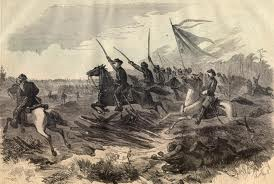Sherman and his men completed their March to the Sea with the siege of Savannah, Georgia. The end of the siege was anti-climactic with Lieutenant General W. J. Hardee evacuating his garrison from the city of Savannah. Sherman sent this message to Lincoln announcing the fall of Savannah.
SAVANNAH, GA., December 22, 1864
(Via Fort Monroe 6.45 p.m. 25th)
His Excellency President LINCOLN:
I beg to present you, as a Christmas gift, the city of Savannah, with 150 heavy guns and plenty of ammunition, and also about 25,000 bales of cotton.
W.T. Sherman,
Major General.
The message reached the White House on Christmas Day. It was published in the papers and roused huge joy throughout the North as another sign that the end of the War was in sight. Lincoln spoke for the North when he telegrammed back to Sherman:
MY DEAR GENERAL SHERMAN:
Many, many thanks for your Christmas gift, the capture of Savannah. When you were about leaving Atlanta for the Atlantic coast, I was anxious, if not fearful; but feeling that you were the better judge, and remembering that ‘nothing risked, nothing gained,’ I did not interfere. Now, the undertaking being a success, the honor is yours; for I believe none of us went further than to acquiesce. And taking the work of General Thomas into the county, as it should be taken, it is indeed a great success. Not only does it afford the obvious and immediate military advantages, but, in showing to the world that your army could be divided, putting the stronger part to an important new service, and yet leaving enough to vanquish the old opposing force of the whole — Hood’s army — it brings those who sat in darkness to see a great light. But what next? I suppose it will be safer if I leave General Grant and yourself to decide. Please make my grateful acknowledgments to your whole army, officers and men.
It must have been an immense relief to be able now to leave military matters to Grant and Sherman, the military team that in less than a year had brought victory in 1865 as the end game for a War that the Union had seemed so many times on the verge of losing.
